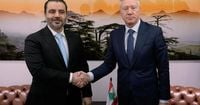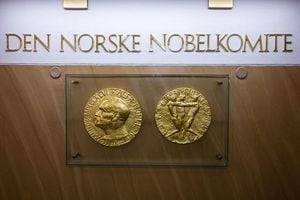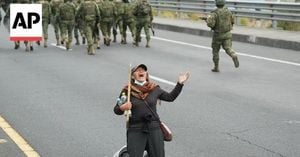On Friday, October 10, 2025, a significant diplomatic event unfolded in Beirut as Syria’s foreign minister, Asaad al-Shibani, made a historic visit to Lebanon. This marked the first high-profile Syrian visit to the country since the dramatic ouster of President Bashar Assad in early December 2024, an event that has reshaped the political landscape of the region. According to Associated Press and The New Arab, the visit was widely seen as a breakthrough in the long-strained relationship between the two neighbors, signaling a potential new era of cooperation and mutual respect after decades of tension.
Al-Shibani’s schedule in Beirut was packed: he held talks with Lebanese President Joseph Aoun, Prime Minister Nawaf Salam, and Foreign Minister Joe (or Youssef) Rajji. The meetings focused on resetting diplomatic ties and tackling a suite of pressing issues that have defined, and often divided, the two nations for years. Chief among these were the status of approximately 2,000 Syrian nationals detained in Lebanese prisons, the demarcation and security of the shared border, the fate of Lebanese nationals missing in Syria, and the complex challenge of facilitating the return of Syrian refugees.
The backdrop to these talks is a tapestry of historical grievances and shifting alliances. Syria’s leadership, now under new rulers following Assad’s fall, harbors resentment toward Lebanon’s Iran-backed Hezbollah group for its role in the Syrian civil war, where it fought alongside Assad’s forces. Conversely, many Lebanese still recall Syria’s 29-year military presence in their country, which ended in 2005 but left lasting scars. The Associated Press noted that the Lebanese-Syrian Higher Council, established in 1991 to symbolize and manage Syria’s influence over Lebanon, had become largely inactive in recent years. On Friday, al-Shibani and Rajji announced that the council had been suspended, with all official dealings now limited strictly to diplomatic channels.
“In this context, we await the appointment of a new Syrian ambassador to Lebanon to follow up on all matters through the Lebanese and Syrian embassies in Beirut and Damascus,” President Aoun stated, as reported by The New Arab. This move is seen as a formal acknowledgment of Lebanon’s autonomy, a point of pride for many Lebanese politicians who had long called for the council’s dissolution.
The Syrian delegation that accompanied al-Shibani was notable for its seniority and breadth: it included Syria’s justice minister, Mazhar al-Louais al-Wais; the head of Syrian intelligence, Hussein al-Salama; and the assistant interior minister, Maj. Gen. Abdel Qader Tahan, according to Lebanon’s state-run National News Agency. These high-level attendees underscored the seriousness with which both sides approached the talks.
Al-Shibani, for his part, was keen to strike a conciliatory tone. “My visit to Beirut is meant to reaffirm the depth of Syrian-Lebanese relations,” he said at a joint news conference. He emphasized Syria’s “respect for Lebanon’s sovereignty,” adding that Damascus seeks to “move past previous obstacles and strengthen bilateral ties.” Rajji echoed these sentiments, stating, “There is a commitment from both the Syrian and Lebanese sides, and a respect for the Lebanese state without interference in its internal affairs – and this is a positive path.”
The path forward, however, is anything but simple. Lebanon currently hosts an estimated 1.5 to 2 million Syrian refugees, the highest per capita figure in the world, a legacy of the brutal conflict that erupted in Syria in 2011. Since Assad’s fall, approximately 850,000 refugees have returned to Syria from neighboring countries as of September 2025, according to the UNHCR. Al-Shibani expressed Syria’s gratitude to Lebanon for hosting Syrians during the war, but both sides acknowledged the need for a “dignified and sustainable return” for those still displaced. Plans are being discussed to ensure that any return addresses the complex post-war realities in Syria.
Security remains a major concern. The Lebanon-Syria border, stretching 375 kilometers, has long been a flashpoint for clashes, smuggling, and infiltration attempts, especially in the volatile Bekaa Valley. In March 2025, the two countries signed an agreement in Jeddah, Saudi Arabia, to demarcate the border and enhance security coordination, aiming to prevent disputes and curb illicit activities, including the smuggling of weapons and military supplies—a practice often linked to Hezbollah and a source of recurring violence. President Aoun remarked that the border situation “has improved compared to the past,” a cautious note of optimism after years of instability.
The issue of detainees also looms large. Many Syrians remain in Lebanese jails without trial, with around 800 held for security-related reasons, including alleged involvement in attacks and shootings. The new rulers in Damascus have pressed for their release, but Lebanese authorities have insisted that those involved in attacks on security forces will not be freed, though they have promised to speed up the trials of long-term detainees.
Efforts to locate Lebanese nationals missing in Syria and to address the legal status of Syrians detained in Lebanon are being channeled through two joint committees, as agreed during a Syrian delegation’s visit to Beirut in early September. These committees, officials say, are designed to handle the most sensitive and intractable issues in a structured, diplomatic manner. It’s a process that will likely take months, if not years, to yield tangible results.
Energy cooperation is another area where the two countries are seeking common ground. In 2022, Lebanon, Syria, and Egypt inked a deal to ship 650 million cubic meters (about 23 billion cubic feet) of natural gas annually from Egypt through Syria to Lebanon’s Deir Ammar power plant. This arrangement is seen as a lifeline for Lebanon’s struggling energy sector, though its implementation hinges on continued regional stability.
The wider regional context cannot be ignored. The fall of Assad and Hezbollah’s significant losses in its recent war with Israel have fundamentally altered the balance of power in the Levant. Since Assad’s ouster, two Lebanese prime ministers have visited Syria, and President Aoun met with Syria’s new President Ahmad al-Sharaa at an Arab summit in Egypt this past March. While no further head-of-state visits are currently scheduled, these interactions reflect a cautious but unmistakable thaw in relations.
Still, the shadow of sectarian violence hangs over Syria. Attacks targeting the Alawite and Druze minorities in March and July 2025 claimed hundreds of lives, reviving fears that the country’s wounds are far from healed. The hope, as articulated by both Lebanese and Syrian officials, is that a renewed diplomatic relationship can serve as a bulwark against further instability.
As the dust settles from a tumultuous year, both Beirut and Damascus appear determined to chart a new course—one defined, they insist, by mutual respect and pragmatic cooperation. The challenges are immense, but for the first time in years, there is a sense that dialogue, not discord, may shape the future of these two intertwined nations.




